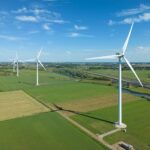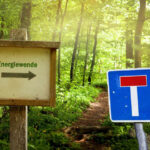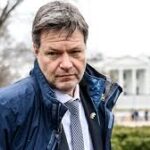Germany is still pursuing its goal of shutting down its nuclear plants but refuses to shut down its lignite plants. It is slashing renewable energy subsidies and replacing them with an auction/quota system. Public opposition is delaying the construction of the power lines that are needed to distribute Germany’s renewables generation efficiently. Renewables investment has fallen to levels insufficient to build enough new capacity to meet Germany’s 2020 emissions reduction target. There is no evidence that renewables are having a detectable impact on Germany’s emissions, which have not decreased since 2009 despite a doubling of renewables penetration in the electricity sector. It now seems certain that Germany will miss its 2020 emissions reduction target, quite possibly by a wide margin. In short, the Energiewende is starting to unravel.
Vervolgens behandelt Andrews de belangrijkste problemen. Allereerst het feit dat de Duitse broeikasgasemissies niet zijn gedaald. En daar was het toch om te doen!
En dát ondanks de stijging van het aandeel hernieuwbare energie.
Wanneer men beide voorgaande grafieken combineert, krijgt men dit.
Hoe komt het dat hernieuwbare energie geen zichtbare invloed heeft gehad? Dat komt omdat deze is gebruikt voor de dekking van een toenemend elektriciteitsverbruik en het wegvallen van nucleaire energie, en niet voor de vervanging van gas, kolen en bruinkool.
 Ondertussen lopen de investeringen in hernieuwbare energie in Duitsland terug.
Ondertussen lopen de investeringen in hernieuwbare energie in Duitsland terug.
Dit betekent dat het hoogst onwaarschijnlijk wordt dat Duitsland de eigen emissiereductiedoelstellingen zal halen.
De verandering van het subsidiesysteem zal het behalen van de doelstellingen van de Energiewende er evenmin gemakkelijker op maken.
Andrews:
The Energiewende has achieved what success it has because of the enormous sums of money lavished on it by the German government in the form of subsidies. Now Germany’s policy is changing in reaction to a 2014 EU decree that disallows the use of direct subsidies, such as feed in tariffs, in favor of “market responsive auctioning” based on “feed in premiums”, or in short a bid system. Interestingly, the EU decree was prompted by other countries [Noot HL: Ook Nederland!] complaining about unwanted renewable power surges from Germany. ….
De veilingen hebben tot dusver teleurstellende resultaten opgeleverd.
Ondertussen behoren de elektriciteitstarieven in Duitsland tot de hoogste in Europa.
De Energiewende was verantwoordelijk voor meer dan 40% van de 28.69 eurocent/kWh, die de Duitse kleine verbruikers in 2015 moesten betalen.
Samenvatting
Andrews:
Germany is a country of contradictions, at least as far as energy is concerned. Germans are in favor of more renewable energy yet oppose building the overhead power lines that are needed to distribute it. They are in favor of deep emissions cuts but also in favor of shutting down Germany’s nuclear plants, which will make the problem of meeting emissions targets far more difficult and costly. The government continues to pursue a nuclear shutdown but is unwilling to shut down Germany’s lignite plants. As a result of these conflicting and counterproductive viewpoints and policies the Energiewende has effectively gone nowhere. Despite the expenditure of many billions of dollars it has failed to achieve any visible reduction in Germany’s emissions or to make a meaningful difference to Germany’s energy mix (renewables still supply only 14% of Germany’s total energy). Its only demonstrable impact has been skyrocketing electricity bills.
And now Germany is discontinuing the direct renewables subsidies that have driven the Energiewende since its adoption in 2000. It might be premature to declare the Energiewende a failure, but things are certainly headed in that direction.
Tot zover Roger Andrews
Lees verder hier.
En dan heeft de auteur het nog niet eens gehad over de elektriciteitsreuzen, RWE en Vattenfall, waarvoor faillissement dreigt. Met zúlk beleid hoeft men zich niet te verbazen dat de armoede in Duitsland groeit.
Moet Nederland met zijn energieakkoord nu werkelijk dezelfde weg op gaan?
Voor mijn eerdere bijdragen over klimaat en aanverwante zaken zie hier, hier, hier, hier en hier.











All pain no gain
De media (Nederlandse en Duitse) besteden veel aandacht aan de groeiende armoede in Duitsland maar men slaagt er niet in de grote witte olifant te benoemen… blijkbaar is dat niet politiek correct. Men komt hooguit tot afnemende koopkracht en vooral niet op de bijna verdubbelde energiekosten door de Duitse opslag duurzame energie (Erneuerbare Energien Gesetz).
Energiewende is op het punt aangekomen dat het gehele project en traject als mislukt is aan te merken.
Dat vertellen mijn veelal Duitse klanten agrotoerisme of wel B&B.
De energie zekerheid is fors afgenomen wat oa te merken is aan de vele kleine maar ook grote storingen in levering energie.
Het ergste van alles is dat vele energiebedrijven afgelopen jaren verlies draaien met het gevolg dat investeringen moeten worden uitgesteld omdat de reserves zijn uitgeput.
En wie gaat opdraaien voor de de-investering dat zijn mega bedragen in orde van 500 miljard of meer.
De consument is al zodanig uitgehold dat deze er niet nog bij kan zonder de economie voor lange tijd ernstig te schaden.
In mijn woonland Polen is een wet aangenomen die verbiedt dat alternatieve energie wind en zon de energiebedrijven en leveranciers schaadt.
Met het resultaat dat vele projecten voor windenergie direct in de prullenbak zijn verdwenen.
Overigs gaat de energiewende een harde landing maken voornamelijk door externe factoren.
Banken zijn wederom in zgn zwaar weer terecht gekomen en niet te vergeten.
Russische dreiging, er moet flink worden gekocht voor de legers in de EU totaal nutteloos maar het gaat wel gebeuren.
1 vaantje minder voor de energie wende: Windmolen in Isselburg (D) vlakbij Dinxperlo (achterhoek) afgebrand
http://www.youtube.com/watch?v=LxHfrAzZifc
De CO2 besparing voor dit vaantje teniet gedaan. Als het al überhaupt CO2 bespaarde. ;-)
Ten gevolge van bliksem!
http://www.youtube.com/watch?v=ge4PzqEUlbU